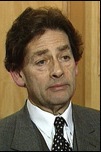Original URL: https://www.theregister.com/2009/11/25/nigel_lawson/
Nigel Lawson: Climate science has turned into religion
Why a think tank? Why now?
Posted in Science, 25th November 2009 14:25 GMT
Interview One thing is missing from the Global Warming Policy Foundation, launched at Westminster on Monday, chairman Lord Lawson admitted. Mrs Thatcher's Chancellor for six years acknowledged that there aren't many young people on board. The average age of the Trustees is 74. You could almost say it pits the Old Aged vs the New Agers.
We got a brief opportunity to talk to Lawson at the launch event - more below.
The think tank is really Benny Piesar's show. The Liverpool anthropologist and policy academic, widely known for founding the CCNet mailing list, is the Foundation's director. The body may disappoint people who want the scientific controversies tackled head on. It's not going to look for the scientific 'smoking pistol' that skeptics crave. What's the point, then?
As with Lawson's book An Appeal To Reason, which dissected the Stern report, it is going to take a look at the policies - and ask whether they're worth it. Lawson resents the assumption, which he said was expressed by state broadcaster the BBC, that if you accepted the majority view of scientists in the field then you had to accept the policies they proposed, too. That's for a democracy to decide.
But speaking to Lawson later, it was clear he didn't think some of the wilder predictions made for man-made global warming had any rational basis.

Lawson
"There is no scientific basis for some of the alarmism. I'm talking about the predictions of warming, and the measurement of the impacts. There's huge alarmism there."
He referred to what he called a "a disgraceful television advertisement" from the Department of Energy and Climate Change. He means the one with the drowning dog.
"We will certainly be actively involved in monitoring what is being said, in correcting errors where the are errors. The only thing we will not be actively engaged in is what are the causes of the temperature changes on the planet: how much is CO2, how much is solar radiation, how much is cosmic rays. We won't be getting into all that."
Lawson was Chancellor when Crispin Tickell, then British Ambassador to the UN, convinced Prime Minister Thatcher that man-made global warming was a problem. Despite Tickell lacking any scientific background (he read history at university) Mrs Thatcher took the population campaigner's views seriously enough to make a landmark speech on global warming. This led to the foundation of a branch of the Met Office, the Hadley Centre at Exeter, to study the issue. It remains one of the three leading climate institutes.
"[Global Warming] wasn't really getting a head of steam back then. It did after I left in the 1990s. I left in 1989," he cautions. But did Lawson anticipate, back then, that it would become this all-encompassing movement?
Fighting religion with a bishop?
"No. I've been constantly surprised by how big a religion it has become." The carbon campaign leaves very few parts of our lives untouched.
"That's right. Maybe my ears are attuned to it, but anything that happens in the world seems to have a climate change angle."
"I'm very glad that I've got a Bishop," he said. "Peter Forster, the Bishop of Chester. He's a very good man. I may be wrong but I think he's the only Bishop in the Church of England with a science degree, and it's very interesting that he should take a view that is in conflict with the Church of England's."
But there are religions and there religions. Not all of them think everything we do is wicked - and this directly informs the choices between mitigation and adaptation policy. Flagellation comes before growth, for example.
Why did Lawson call it a religion?
"There are two things really. One is the view that man is irredeemably bad, and needs to atone for his sins by making some kind of sacrifice. When bad things happen they are somehow a judgement on mankind," says Lawson.
"Then there is the position the Bishop of Chester takes which is that something of this age, and that's a pessimism. That's something he finds very undesirable."
But even in the great socialist utopias, there was an optimism in science. Scientific socialism could be applied to shape society. There wasn't anything that wasn't an engineering problem.
He agrees. So why are scientists viewed uncritically when they make pronouncements about climate, now?
"That's not real science."
Finally, on branding, the choice of 'Global Warming' is quite deliberate, Lawson said. “Climate change is a rather woolly term, sometimes it means man-made global warming and sometimes it doesn’t”.
The body will only take contributions from individual grassroots contributors and trusts, said Lawson. More from the GWPF here. ®